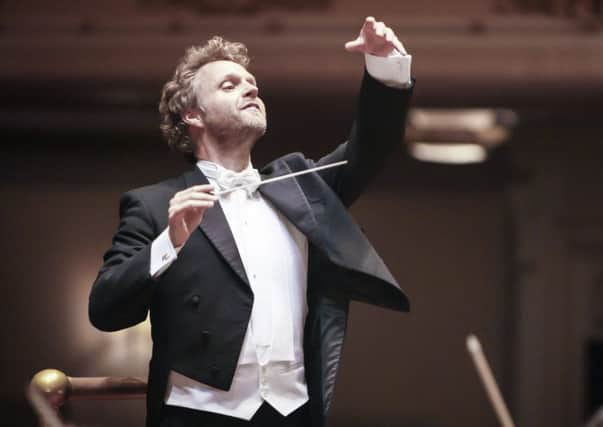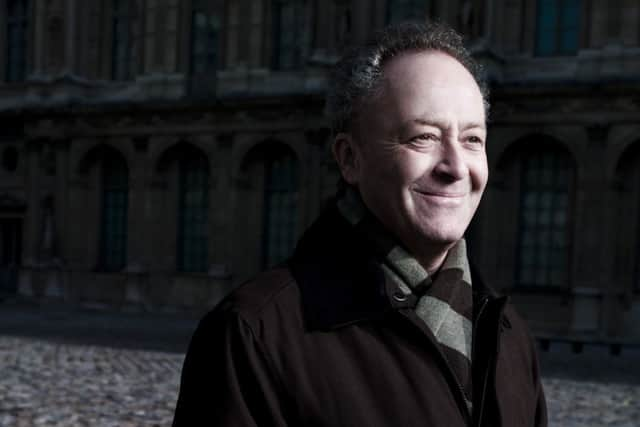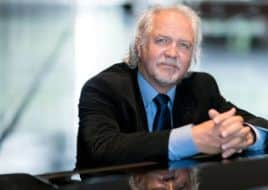Ken Walton: Reinvigorating the concert programme


When all three of Scotland’s national orchestras release their 2015-16 season programmes in the space of seven days, you are inevitably faced with an embarrassment of riches. The question is how to make sense of it all, with over 75 main season programmes in Edinburgh and Glasgow alone, and smaller portions of that in other regular city venues.
The obvious starting point is to identify the highlights – the concerts that leap out of the brochure pages as “must sees”, remembering of course that it’s not just about repertoire or star performers, but how imaginatively these two facets are combined.
Advertisement
Hide AdIt’s going to be fascinating, for instance, to hear large Romantic works such as Brahms’ four symphonies played by the Scottish Chamber Orchestra and interpreted by principal conductor Robin Ticciati, whose recent Berlioz recordings and performances have been revelatory. In addition to the four symphonies, there will also be an airing for the profoundly humanistic “German Requiem”.


Then there’s the SCO’s energetic new principal guest conductor Emmanuel Krivine, who will develop his new association in highly-anticipated performances of Wagner’s Wesendonck Lieder (with Scots mezzo soprano Karen Cargill) and a season finale featuring Beethoven’s Eroica – a sequel, in a sense, to the climax of last season when he conducted Beethoven’s Ninth Symphony.
There are focuses on Bach, too, one concert in particular under the direction of Glasgow University music professor John Butt, whose pioneering work in that area of repertoire with his own Dunedin Consort has become something of a world phenomenon, though his debut SCO programme takes us beyond JS Bach, through the music of two of his sons and onwards to Mozart’s Symphony No 40.
Recognition of the Sibelius/Nielsen 150 celebrations continues with appearances by violinist Pekka Kuusisto (Nielsen’s beguiling concerto), and old favourite Joseph Swensen, who conducts Sibelius’ Third Symphony. Llyr Williams makes welcome returns in two of Beethoven’s piano concertos.
The SCO Chorus celebrates its 25th anniversary under the baton of Richard Egarr, in Handel’s dramatic oratorio Theodora and Bach’s wonderful Magnificat. And there’s one particular gem featuring as part of the SCO’s link-up with Greyfriars Kirk’s Spark Festival when organist David Briggs is joined by the SCO strings in Kenneth Leighton’s rarely-played Organ Concerto, written for the same forces as the Poulenc concerto, and played alongside it in this October concert.


If you miss that Poulenc, there’s another chance to hear the same concerto a few weeks later in an RSNO season that marks the start of 125th birthday celebrations running across the next two seasons. What makes that Poulenc so intriguing is that the Glasgow performance will mark the inauguration of the new organ being installed in Glasgow Royal Concert Hall. But before Scotland’s organ buffs get too excited, they should realise that this is not the marvellous new Rieger pipe organ promised 15 years ago, for which plans exist, but a large-scale digital organ funded by Glasgow’s Merchants House.
Advertisement
Hide AdIt’s an affordable compromise, but acting chief executive of the RSNO, Kenneth Osborne, is confident that this bespoke new instrument is 100 per cent custom-built for the GRCH, and will satisfy the requirements of French organist Thierry Escaich when he tackles the Poulenc and Saint-Saëns’ Organ Symphony in November’s celebratory concert.
Otherwise, the RSNO treads familiar ground, with Mahler’s “Resurrection” Symphony under music director Peter Oundjian as a blockbuster opening, and Beethoven’s Ninth as the central 125th celebration concert to close the season.
Advertisement
Hide AdIn between, it’s the usual meaty stuff, such as award-winning pianist Boris Giltburg as soloist in the second and third of Rachmaninov’s piano concertos, soloist Vilde Frang in Brahms’ Violin Concerto, the orchestra’s excellent principal guest conductor Thomas Søndegård in Szymanowski’s Symphony No 4, and the welcome return of former music director Stéphane Denève in a programme that features Steven Osborne in Ravel’s Piano Concerto for the Left Hand and the Scottish premiere of James MacMillan’s The Death of Oscar, which Denève commissioned for his new orchestra in Stuttgart. Nicola Benedetti also makes a perennial appearance, and the brilliant pianist Nikolai Lugansky appears twice in concertos by Prokofiev.
The new season should also see the RSNO finally take up residence in its new HQ and studio at the GRCH, where it will unveil a new series called “Under the skin of….”, in which presenter Sandy Burnett takes audiences through the music of featured composers. The first two feature Tchaikovsky in October, and Stravinsky in May 2016. Film music buffs will be delighted that the RSNO is also extending its programming activity in that area.
The big news at the BBC SSO is the appointment of Thomas Dausgard as principal conductor, succeeding Donald Runnicles, who will maintain his links after 2016 as conductor emeritus. Dausgaard will play to his own Nordic specialties in a bumper concert featuring Sibelius’ last three symphonies (initial reviews last week of his unfolding Sibelius cycle with the Seattle Symphony Orchestra, where he is principal guest, were very enthusiastic), but will also share both of Brahms piano concertos over two consecutive final season concerts with Runnicles. Common to both concerts is the phenomenal Russian pianist Denis Kozhukhin.
Runnicles bows out in style, with Deryck Cooke’s reconstruction of Mahler’s Symphony No 10 as a season opener, and with the First Symphony as his end-of-season swansong.
The SSO’s repertoire is typically wider-ranging than the other two orchestras, with focuses on South Korean composer Unsuk Chin, Ilan Volkov in Charles Koechlin’s sumptuous Hollywood-inspired Seven Stars Symphony, Beethoven’s Missa Solemnis with the Edinburgh Festival Chorus and, in the orchestra’s 80th birthday concert, a new work by artist-in-association Matthias Pintscher, Idyll, conducted by the composer himself.
For its Edinburgh followers, Runnicles’ Mahler 10, Dausgaard’s Brahms Piano Concerto programme and Alexander Vedernikov conducting Mussorgsky’s Pictures at an Exhibition maintain the SSO’s annual three-concert presence in the Usher Hall.
And that’s just a snapshot of three solid, complementary orchestral seasons.
• Full information on Scotland’s 2015-16 orchestral seasons is at www.rsno.org.uk, www.bbc.co.uk/bbcsso and www.sco.org.uk